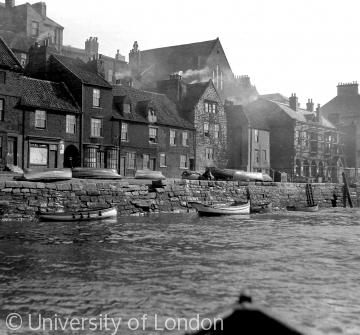Customs officers 1660-1719 and customs houses

Transcribed and introduced by Maureen M Meikle. The customs posts were prized at Sunderland, so there was always competition when a vacancy arose. Even the more humble offices of boatman, waiter and searcher were fought over and were sometimes awarded to members of the same families. The officers listed in the table are assumed to have remained in office, unless subsequently listed as dismissed, dead or re-appointed elsewhere. Those who died in office did so presumably from natural causes as there was no recorded violence between smugglers and customs men. A new Board of Customs had been established in 1671 to regularise customs collection and rout out corruption. This board replaced the old system of farming out the customs to leasees. By 1672 Walter Ettrick was being praised for his diligence in keeping the Sunderland customs’ accounts, but Mr Potts at Stockton was not.[i] In 1690 the salaries were as follows: Walter Ettrick, collector £50 p.a. and £10 additional, Richard Potts, surveyor £30 p.a. and £10 additional, Henry Bickerdick, Robert Berwick and Cuthbert Willson, waiters and searchers, £25 each p.a. and £5 additional, John Jeffreys, landwaiter £20 p.a. and £8 additional, John Loaton, boatman, £15 p.a.[ii] Landwaiters dealt with imports, whilst tidewaiters (tidesmen) and boatmen worked afloat amongst shipping in the port. In December 1701 the customs commissioners were to establish further guard officers on the coast from Newcastle to Bridlington. The increasing size of the collier fleet meant that the customs collectors needed more employees. Some officers were commended by the Treasury for in 1713 Jonathan Deeplake, ‘at present a boatman at Sunderland, who has done considerable service to the revenue, particularly in the discovery of frauds and illegal practices in the Coal Duty at Rochester and in discovering several notorious owlers’ was awarded the £40 p.a. post as surveyor of Rochester, with two boatmen to attend on him. [iii] The highest office of collector of customs at Sunderland was the subject of a job swap in 1717. William Ettrick was ‘praying leave to exchange places with Arthur Robinson, collector of Dartmouth, he [petitioner] being afflicted with sciatica shall be much nearer the Bath for his health.’ They changed places in November. [iv][i]
F.W. Dendy, ed. Extracts from the Records of the Merchant Adventurers of Newcastle upon Tyne, Surtees Society, 101 (Durham, 1899), ii, 151-2. [ii] Cal. Treas. Bks 1681-85, 177, 1092; 1685-89, 1949; 1689-92, 928. [iii] Cal. Treas. Bks 1700-1701, 427; 1709, 467; 1713, 387; 1714-19, 494. [iv] Cal. Treas. Bks 1717, 504.
Content generated during research for two paperback books 'Sunderland and its Origins: Monks to Mariners' (ISBN 13 : 9781860774799) and 'Sunderland: Building a City' (ISBN 13 : 978-1-86077-547-5 ) for the England's Past for Everyone series





